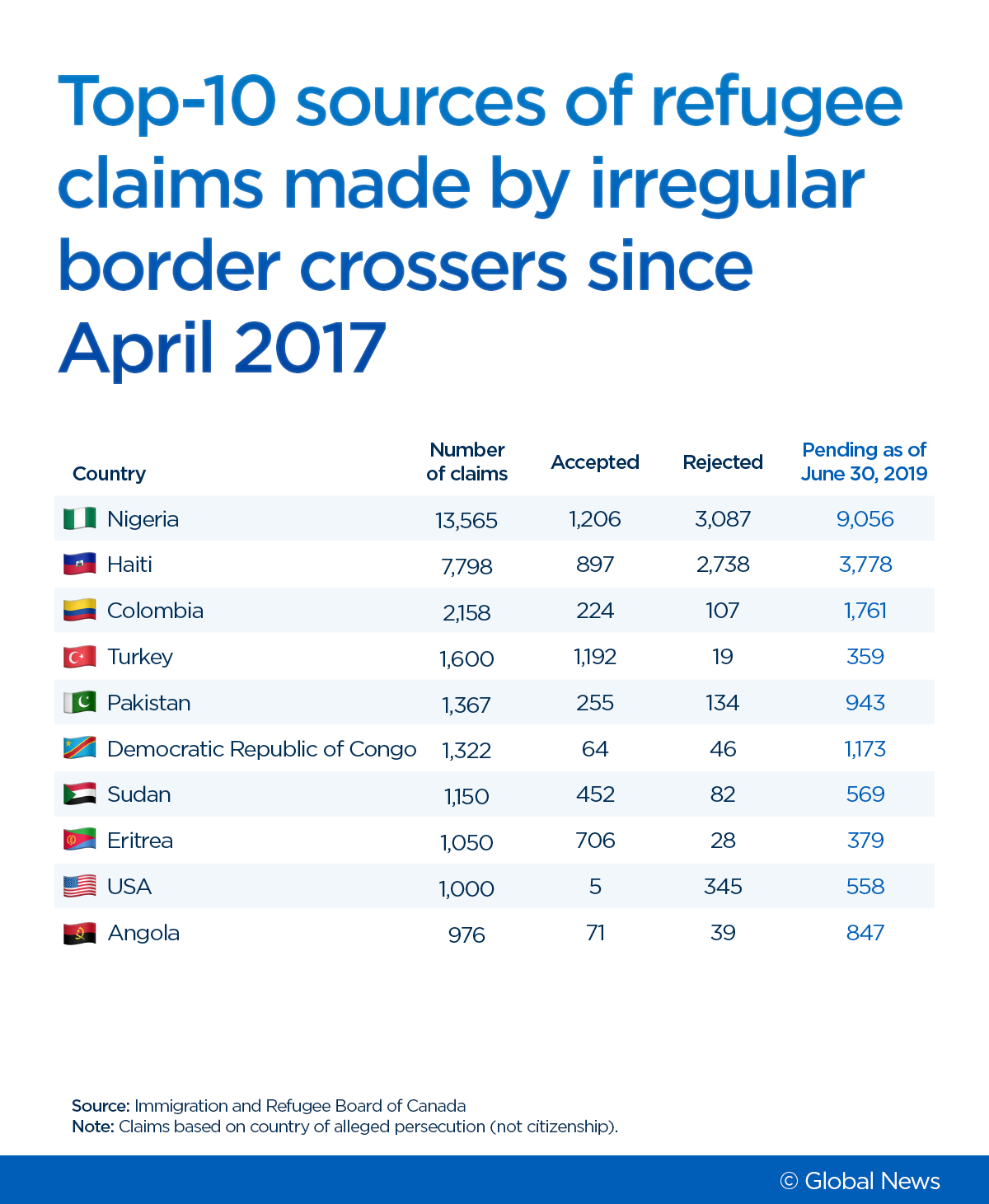On Monday, the Federal Court in Toronto will begin hearing weeklong arguments in a constitutional challenge to the Safe Third Country Agreement (STCA) between Canada and the United States.

Those challenging the deal include the Canadian Council for Refugees, the Canadian Council of Churches, Amnesty International and several would-be refugees — including a woman who says she was raped by an MS-13 gang member in El Salvador.
The group says the border agreement, which requires claimants make a refugee claim in the first “safe” country they arrive in, is unconstitutional because it discriminates against women who allege sexual assault or domestic abuse and because it deprives asylum seekers of their fundamental rights to life, liberty and security of the person.

“The evidence now before the court establishes that the refugee claimants Canada turns away at our borders are exposed to grave risks of detention and mistreatment in the U.S.,” wrote lawyers for the group challenging the deal.

The STCA was established in 2004 and allows Canada to turn away asylum seekers at official border crossings if they do not meet certain exemptions. This deal was not widely talked about until the spring of 2017, when the number of people seeking asylum in Canada each year doubled, from 23,350 in 2016 to more than 47,000 in 2017.
This spike, and the fact that tens of thousands of people had begun exploiting a so-called “loophole” in the agreement by entering Canada at unofficial points of entry, caused many people to argue the government should do more to control the borders.
Others, such as Janet Dench, director of the Canadian Council for Refugees, believe anti-immigrant policies enacted by the Trump administration have made America unsafe for asylum seekers.
- Life in the forest: How Stanley Park’s longest resident survived a changing landscape
- ‘Love at first sight’: Snow leopard at Toronto Zoo pregnant for 1st time
- Buzz kill? Gen Z less interested in coffee than older Canadians, survey shows
- Carbon rebate labelling in bank deposits fuelling confusion, minister says
Dench argues that if Canada does not scrap the STCA, it will be falling short of its international obligations by sending asylum seekers back to the U.S. where she says people do not always receive a fair hearing and where they could be returned to their home countries despite the risk of persecution, even death.
If the court accepts these arguments, the government could be forced to either suspend or withdraw from the STCA.
“It has become clear to us that the U.S. is not a safe country and we should not be sending people back,” Dench said.
Not the first challenge
This isn’t the first time the STCA has been challenged constitutionally.
In 2007, the same group of applicants was successful in getting the deal deemed unconstitutional by the Federal Court when Justice Michael Phelan ruled that Canada was exposing would-be refugees to the risk of harm and possible torture by sending them back to the U.S. where they could be deported.
But this decision was overturned a year later due in part to issues of jurisdiction and because the Federal Court of Appeal ruled that the arguments made at the time were largely “hypothetical,” meaning it wasn’t clear that asylum seekers were actually being exposed to risk when turned away by Canada.

However, Dench says the circumstances in America have changed significantly since this decision was overturned. She points to the Trump administration’s policy of indefinitely detaining asylum seekers while their claims are heard and to the act of separating children from their parents as obvious examples of why the U.S. is no longer safe for would-be refugees.
There has also been rising fear over anti-immigrant rhetoric in America that has driven asylum seekers to Canada, Dench said.
This was confirmed by a recent study conducted by Craig Damien Smith, director of the Global Migration Lab at the Munk School of Public Policy in Toronto, which found that a significant percentage of recent asylum seekers entering Canada left the U.S. because of fears over domestic policies and anti-immigrant rhetoric.
This includes Trump’s plan to end temporary resident status for more than 300,000 people living in the U.S. from countries such as Haiti, Sudan and Somalia, the study showed.
Domestic and gang violence no longer qualify
New U.S. policies barring women who allege domestic abuse and people fleeing gang violence from making asylum claims are other examples of why Dench believes the U.S. is no longer safe for asylum seekers.
Under these policies, women who fear gender-based violence, such as rape and sexual assault, and those who say they could be killed by gangs cannot get protection in the U.S. and could be deported.

One of the applicants in the current court challenge of the STCA is a woman from El Salvador whose husband claimed he was nearly killed by the notorious MS-13 gang. Her husband fled to Canada in 2005 without his family after he testified against several MS-13 gang members who he said murdered his brother.
In 2017, the woman, who had herself become a target of MS-13 violence, including being raped and impregnated by a gang member, tried to enter Canada but was told she was not exempt under the STCA and could not make a refugee claim because her husband did not have permanent resident status in Canada.
According to Dench, if the woman and her children are sent back to the U.S. there’s a good chance they could be returned to El Salvador, where they could be hunted down and killed by MS-13 gang members.
“When we turn people away who are knocking on our door and we won’t even hear their claims that’s a real problem,” she said.
Challenge ‘must be dismissed’
Lawyers for the government say arguments made by Dench and those challenging the STCA have no merit and that the case should be dismissed.
The government argues that the STCA does not discriminate against women and that the U.S. is a “safe” country for would-be refugees, adding that this is demonstrated by the fact that thousands of asylum cases are approved in America each year.
In their submissions to the court, government lawyers say Canada is committed to maintaining its obligations under international law, including making sure asylum seekers are not sent back to countries — either directly or indirectly — where they could be harmed, tortured or even killed.
The government also notes that many of the anti-immigrant policies enacted by the Trump administration and referred to by Dench and others have been “limited” by American courts or are still undergoing legal challenges. This includes the separation of children and parents at the U.S.-Mexico border and policies barring those who fear gender-based or gang violence from making refugee claims.
Immigration Minister Ahmed Hussen has also argued that claims about would-be refugees being denied fair hearings in Canada and the United States are untrue.

Hussen has said anyone who enters Canada and is not allowed to make an asylum claim is given a pre-removal risk assessment to ensure they are not being sent back to possible harm.
But advocates, including Dench, have argued that this is insufficient and does not meet the government’s obligation to provide all asylum seekers with a full-hearing before the Immigration and Refugee Board of Canada.
The current challenge to the STCA will be heard by Justice Ann Marie McDonald. Dench expects it will take several months for a ruling due to the complexity of the legal arguments.
Supporters of the challenge will hold a rally outside the Toronto courthouse on Monday afternoon.
Contact: brian.hill@globalnews.ca





Comments